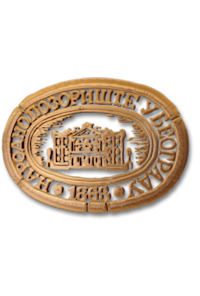Andre Chenier's opera is a passionate love story inspired by the life of the French poet - André Marie Chenier, who died during the French Revolution. His sensual and emotional poetry makes him a forerunner of the Romantic movement, and his literary reputation is largely based on posthumously published works. Unfortunately, his career was abruptly interrupted when he was executed on the guillotine and accused of "crimes against the state", at the end of the Reign of Terror. Gerard's character is based in part on Lambert Talien, one of the leaders of the Revolution. Andre Marie Chenier (October 30, 1762 - July 25, 1794) was born in Constantinople, where his father, Louis Chenier, was in the consular service; they returned to France when Andre was three years old. His mother was of Greek descent. During 1783, Andre joined the French Regiment in Strasbourg, but soon lost interest in his military career. Upon his return to Paris in 1784, he began writing songs in the then prevailing neoclassical style. He found the greatest inspiration in his travels to Rome, Naples and Pompeii earlier that year. He wrote mostly idylls, elegies and pastorals, imitating Theocritus, Bion of Smyrna and other Greek poets. He experimented with verses, especially didactic and philosophical ones; with his work Hermes, for example, he wanted to summarize D. Diderot's Encyclopedia in a poem similar to Lucretius's. Today, this poem exists only in fragments, and it deals with man's place in the universe - as an individual and as a social being. Fragment entitled L ' The Invention presents Shenyi's view of poetry: "We write ancient verses from new thoughts." In November 1787, a family friend who had been appointed ambassador to Britain took Andrea as secretary. He was unhappy in England, he despised British hypocrisy: "... these Englishmen. A nation that sells itself to those who give more. Going from country to country around the world, they offer their low values and their rough elegance ... "The revolution and great success of his younger brother, Marie-Joseph, as a politically engaged playwright and pamphlet writer, prompted him to return to France. He came to Paris in 1791 and became a supporter of the revolution, but as part of a moderate current that advocated a constitutional monarchy. However, his work is becoming aggressive and dangerous: instead of gentle idylls, he began to write harsh satires: the prose work Avis au peuple français (August 24, 1790) and the rhetorical work Jeu de paume (in which he addresses the radical painter Jacques-Louis David). He often writes for the "Paris Journal", where he sharply criticizes the conspirators of the creation of the republic. The revolt of August 10, 1792, destroyed his party, newspapers and friends, and he escaped the September massacre by taking refuge with a relative in Normandy. A month after these events, his brother Marie-Joseph entered the anti-monarchist assembly. Andre strongly protested against the attack on the monarchy, and at the request of Malesherbe, the lawyer of King Louis XVI, he wrote arguments for the defense of the king. After the execution of Louis XVI, in January 1793, Sheni found refuge in Versailles and only went out at night. There he wrote his great Ode to Versailles. A few months after the king's execution, a period known as the Reign of Terror began, lasting from September 1793 to July 1794. The leaders of the revolution, led by Maximilian Robespierre, took drastic measures against those they considered opponents of the revolution (nobles, clergy, monarchists). .). By revoking the defendants' right to public defense, they sentenced about 1,400 Parisians to summary deaths. Chenier was arrested on March 7, 1794, and taken first to the Luxembourg Palace and later to the Saint-Lazare Prison. During his 140 days in captivity, he wrote a series of verses that "hiss and pierce like poison bullets," in which he renounces the assembly; those verses were smuggled by one of the guards and delivered to his family. He also wrote his most famous song in prison, Young Prisoner, inspired by the misfortune of other prisoners. Ten days before Chenier's death, the painter Joseph-Benoit Suva completed his well-known portrait. Robespierre remembered that Chenier was the author of poisonous verses published in the "Paris Journal" and arranged for him to be tried before the revolutionary court that sentenced him to death. Chenier was one of Robespierre's last victims: he was executed on the guillotine on July 25, 1794, as a traitor, along with Françoise-Theresa de Choisel-Stanville and Prince Joseph of Monaco. Robespierre was captured and executed three days later. Chenier was only 31 years old, and he was buried in Pikpa Cemetery. The critical review of Chenier's works was very diverse. He toyed with the classical heritage translated into verse in French to a greater extent than his contemporaries; on the other hand, restlessness and melancholy in his poetry announce romanticism, which Charles Augustin Saint-Bev noticed in 1828 (he "inspired and determined" the romanticism movement), calling him the predecessor of Victor Hugo. There were other critics who wrote about Chenier as an innovative and pre-romantic poet. However, Anatole France claimed that Chenier's poetry was one of the last outgrowths of 18th-century classicism and that his work should not be compared to Igo's and Parnassus' poets, but to philosophers like Andrea Moreau. Paul Morijo claimed that Chenier did not meet the usual characteristics of Romanticism from the 1920s (a penchant for Northern literature, the Middle Ages, newspapers and experiments). The poet Jose Maria de Heredia greatly appreciated Chenier ("I don't know of the more refined verses in French than these three hundred verses of Bucolic") and agreed with Saint-Bev's view that Chenier was a poet ahead of his time. He was very popular in Russia, where Alexander Pushkin wrote a song about his last moments, and Ivan Kozlov translated The Young Detainee into Russian. Several of Chenier's poems were also very popular with English-speaking critics: his love of nature and political freedoms was compared to Shelley's, and his penchant for Greek art and myths reminded them of Keats. Chenier's destiny has become the subject of many plays, paintings and poems. In addition to the opera by Andre Chenier by Umberto Jordan, there are also the song Justice of the Forces of Pridom, a novel by Stello by Alfredo de Vigny, a delicate statue of Denis Pooh in Luxembourg and Miller's famous portrait The Last Days of the Reign of Terror.








